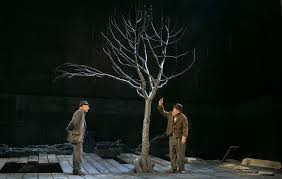General Resources
Movie Adaptations and theatrical productions
Documentaries
- The History of Beckett’s “Waiting for Godot” (1994)
- Samuel Beckett: Silence to Silence documentary (1991)
Video Lectures
- Ian McKellen Discusses “Waiting for Godot”
- Theatre and Language: Samuel Beckett, ‘Waiting for Godot’ – Professor Belinda Jack
- The meaning of Godot – Drama undergraduate taster lecture, University of Birmingham
- Samuel Beckett: Waiting for Godot, Vidyamitra
- Swayam Prabha: Waiting for Godot by Samuel Beckett: Presenter:Narendra Sarma
Study Guides
Main Topics
- Waiting for Godot as an absurd drama
- Existentialism in Waiting for Godot
- As a tragicomedy
- Relationship between Lucky and Pozzo
- Characters of Vladimir and Estragon
- Identity of Godot
- Structure of the drama
Questions
- For what or whom are the main characters in “waiting for God” waiting for and why do they wait?
- What was the relationship between Pozzo and Lucky from post colonial perspectives ?
- Why is the play in two acts?
- Who is Goddot?
- Estragon repeats “Nothing to be done.” Why?
- character of the boy
- Comment on: “cut off from his religious, metaphysical roots, man is lost”
- In waiting for Godot, what would Beckett determine is the meaning of human life?
- Analyze Lucky’s monologue
- Comment on the title of Waiting for Godot
- Why do Estragon and Vladimir stay together even though it is suggested throughout the play that they part ways?
- What do the acts of pulling off one’s boot and pulling on and off one’s hat signify in the drama?
- What does the tree symbolize in Waiting for Godot?
- Is Waiting for Godot more nihilistic or existentialist, and why?
- What are the symbols in Waiting for Godot?
- The setting of the play
- How does Lucky’s speech in Waiting for Godot relate to God, and what is the meaning behind it?
- How does the play Waiting for Godot show that time is meaningless?
Tasks for students
- Prepare the questions and send your answers to TTM at ttm1974@gmail.com

